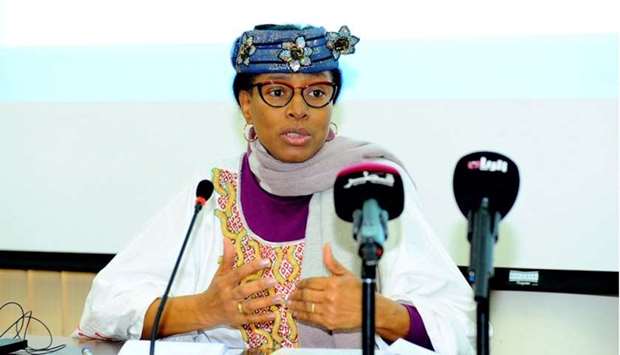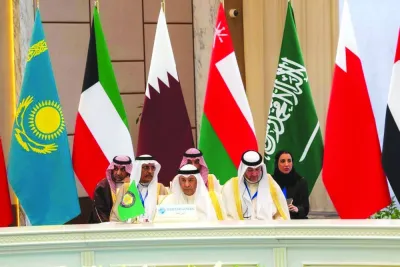The United Nations Special Rapporteur on the right to education, Dr Koumbou Boly Barry, said on Saturday that she was examining the violations of the rights of hundreds of Qatari students who had been deprived of their education because of the blockade imposed on Qatar.
On June 5, 2017, Bahrain, Saudi Arabia, the United Arab Emirates and Egypt cut off diplomatic ties with Qatar and imposed an ujnust blockade on the country.
When the siege countries cut ties with Qatar and imposed air, land and sea blockade on Qatar, they also asked Qatari citizens, including students, in their countries and their citizens in Qatar to leave within 14 days.
Addressing a seminar hosted by Qatar University and organised by the National Committee for Human Rights (NHRC) on the role of UN rapporteurs in protecting human rights, Dr Koumbou Boly Barry noted that during her visit to Doha she had met with those affected by the blockade, adding that she had examined the violations of the right to education, which affected hundreds of students who have been deprived of that right.
A report by Qatar's National Human Rights Committee has revealed that as many as 213 Qatari students were forced to discontinue their education in United Arab Emirates (130 students), Saudi Arabia (55 students) and Bahrain (28 students), as well 706 students were forced by their countries to discontinue their education in Qatar University.
The Committee has received complaints from students affected by decisions of the siege countries, as these countries banned universities and educational institutions to deal with deported Qatari students who were not even refunded the money they paid to these universities.
Universities in UAE, Saudi Arabia and Bahrain refused to provide these students with admission certificates, and those students who had graduated could not receive their graduation certificates, the Committee's report revealed.
Dr Koumbou said all countries, except one, have signed the International Covenant on Civil, Economic and Social Rights, adding that this mechanism, ratified 70 years ago, promotes the freedoms and dignity of the people of the world.
She added that her duties involve asking countries that ratified the covenant why they have not honoured its commitments.
She highlighted the existence of about 1bn people across the world who are deprived off their right to education, and in this context, she stressed Qatar's commitment to the provision of basic education, where all children of school age get their right to basic education in this country.
She commended Qatar for focusing on the development of the education sector and promoting it to global standards.
She also highlighted other success stories in countries such as Burkina Faso, Niger and Cote d'Ivoire, which in one decade have achieved what they couldn't in 60 years, making clear progress in gender equality in education, helping families educate their children, and people with special needs.
The United Nations High Commissioner for Human Rights' Karim Khazrawi praised the commitment of Qatar to enhancing human rights and co-ordinating with the designated bodies in that regard.
He added that Qatar had responded to the recommendations made regarding expatriate workers, noting that very positive results are coming out of that - with the cancellation of the kafala system and the exit permits.
The seminar was moderated by member of NHRC Dr Mohamed Said al-Kuwari.
On June 5, 2017, Bahrain, Saudi Arabia, the United Arab Emirates and Egypt cut off diplomatic ties with Qatar and imposed an ujnust blockade on the country.
When the siege countries cut ties with Qatar and imposed air, land and sea blockade on Qatar, they also asked Qatari citizens, including students, in their countries and their citizens in Qatar to leave within 14 days.
Addressing a seminar hosted by Qatar University and organised by the National Committee for Human Rights (NHRC) on the role of UN rapporteurs in protecting human rights, Dr Koumbou Boly Barry noted that during her visit to Doha she had met with those affected by the blockade, adding that she had examined the violations of the right to education, which affected hundreds of students who have been deprived of that right.
A report by Qatar's National Human Rights Committee has revealed that as many as 213 Qatari students were forced to discontinue their education in United Arab Emirates (130 students), Saudi Arabia (55 students) and Bahrain (28 students), as well 706 students were forced by their countries to discontinue their education in Qatar University.
The Committee has received complaints from students affected by decisions of the siege countries, as these countries banned universities and educational institutions to deal with deported Qatari students who were not even refunded the money they paid to these universities.
Universities in UAE, Saudi Arabia and Bahrain refused to provide these students with admission certificates, and those students who had graduated could not receive their graduation certificates, the Committee's report revealed.
Dr Koumbou said all countries, except one, have signed the International Covenant on Civil, Economic and Social Rights, adding that this mechanism, ratified 70 years ago, promotes the freedoms and dignity of the people of the world.
She added that her duties involve asking countries that ratified the covenant why they have not honoured its commitments.
She highlighted the existence of about 1bn people across the world who are deprived off their right to education, and in this context, she stressed Qatar's commitment to the provision of basic education, where all children of school age get their right to basic education in this country.
She commended Qatar for focusing on the development of the education sector and promoting it to global standards.
She also highlighted other success stories in countries such as Burkina Faso, Niger and Cote d'Ivoire, which in one decade have achieved what they couldn't in 60 years, making clear progress in gender equality in education, helping families educate their children, and people with special needs.
The United Nations High Commissioner for Human Rights' Karim Khazrawi praised the commitment of Qatar to enhancing human rights and co-ordinating with the designated bodies in that regard.
He added that Qatar had responded to the recommendations made regarding expatriate workers, noting that very positive results are coming out of that - with the cancellation of the kafala system and the exit permits.
The seminar was moderated by member of NHRC Dr Mohamed Said al-Kuwari.



